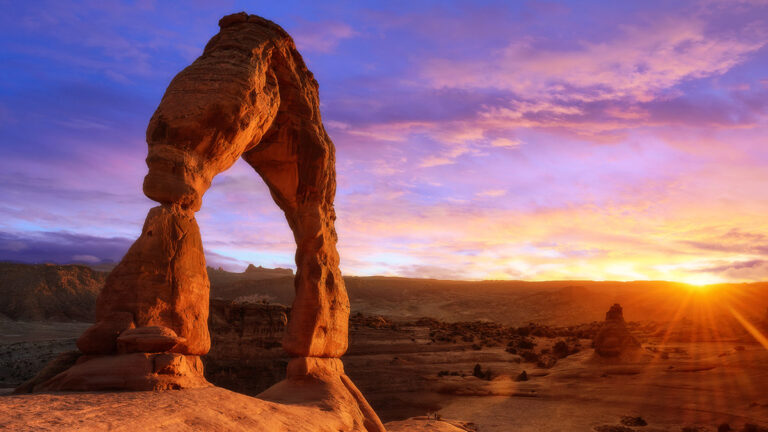
Utah House Rep. Kera Birkeland, R-Morgan, has attracted a lot of attention with a proposal for a constitutional amendment to create a state lottery. She plans to file a bill that would have to pass in the legislature before going to voters in the November 2024 elections.
The lawmaker says revenue generated from the lottery could help alleviate the pressure homeowners have been feeling from rising property taxes. Birkeland told local news outlets that she knows she’s facing an uphill battle and is ready for it.
Utah is one of only two states with no legal gambling whatsoever, the other being Hawaii. Three other states—Alaska, Alabama, and Nevada—are without a lottery but have other forms of gambling available. Hawaii and Alabama have both given the topic of legalized gambling some thought in recent years, but so far, without making any progress.
In other states, the primary obstacle to gambling expansion is resistance from existing stakeholders. There is no such fear of competition in Utah, but moral opposition will be strong. Followers of the Church of Jesus Christ of Latter-day Saints (LDS)—i.e., Mormons—have traditionally accounted for roughly two-thirds of the state’s population. The Church’s official stance is against any sort of lottery or gambling, and its members are generally known to toe the line.
Similar moral resistance on religious grounds can be found in other states from evangelical Christians. Nowhere do they hold quite as strong a demographic majority as Mormons do in Utah, but Tennesse, which is 52% evangelical, nonetheless managed to legalize sports betting. That provides some hope that Utah’s lottery effort may not be a complete non-starter.
Birkeland Says the Lottery Will Generate $200 Million
According to Birkeland, Utahns are already spending millions on lottery tickets. She told a local news station that in her research for the bill, she found that they spend as much as $200 million buying tickets out of state. That means Utah faces a problem similar to what states without a regulated online casino market suffer from the offshore black market. It can’t prevent its residents from playing; in trying to do so, it cuts itself off from any potential benefit.
That money Utah residents spend on their tickets goes to neighboring states like Wyoming, Idaho, and Arizona. In 2012, a study showed that almost one in five lottery tickets sold in Idaho were bought by Utahns. That number may be even larger now that billion-dollar-plus jackpots are making headlines regularly.
Birkeland believes the revenue from a lottery could help keep taxes lower. She’s primarily concerned with property taxes. Many of her constituents have told her they’re struggling to keep up with their skyrocketing tax bills.
When I talk to my constituents, and they cannot afford to stay in their homes, our property taxes are just getting out of control.
Birkeland is still working on finalizing the bill text. However, she said her focus is on older Utahns who live on fixed or low income.
Lottery Legalization Faces Opposition
While it hasn’t officially responded to the news of the proposed bill, the LDS Church is against any form of gambling, including the lottery. Its website states this clearly:
The Church of Jesus Christ of Latter-day Saints is opposed to gambling, including lotteries sponsored by governments. Church leaders have encouraged Church members to join with others in opposing the legalization and government sponsorship of any form of gambling.
The Church holds a strong historical influence in Utah. According to its website, the LDS Church has almost 2.2 million members in the state, about 64.3% of its population. Other sources have usually put the number at between 60% and 70%. However, the most recent data suggests that membership is declining.
Regardless, representation in the state’s legislature is even higher. As of 2021, almost 90% of Utah’s lawmakers were LDS church members, which will make it hard for Birkeland to muster support.
It doesn’t help that she can count Governor Spencer Cox as an adversary. Immediately after news of the bill came out, he stated his opposition to it. The only redeeming factor on that front is that Cox’s signature won’t be needed for a proposed constitutional amendment as it would for a conventional law, as the voters will make the final decision.
Are Shifting Demographics Enough to Establish a Lottery?
Rep. Birkeland says she expects fierce. However, she hopes everyone can see the bigger picture and that it would be for the good for the state. She added,
I think it’s time for adults to be able to make adult decisions and to be able to do it and put the money into the state of Utah.
Her hopes notwithstanding, the odds are heavily against the question making its way to voters. Utah has occasionally seen other attempts to legalize some sort of gambling in the past, including skill-based games and horse 0betting, but never with any success.
However, getting the conversation started might prove useful. Utah’s demographics are shifting in a way that could make a lottery more achievable in the future. Some studies suggest that as much as a third of LDS members end up leaving the Church. One paper has even suggested that Mormons no longer hold a majority in the state, finding that membership had dropped to 42% in 2023.
Nor do the members necessarily take the Church’s position on every issue. One recent study found that 72% of Utahns support same-sex marriage, another issue the LDS Church opposes.
The argument about lost revenue may also sway some lawmakers. Utahns will likely continue crossing the border to buy lottery tickets if they lack a local option. That means Utah is missing out on tens or hundreds of millions of potential revenue. This is the bigger picture Birkeland talks about.
Unlike Utah, some of the other holdouts are seeing gambling movement, given the potential revenue. A lottery bill in Nevada passed the state Senate in June. Meanwhile, in Alabama, more lawmakers are starting to get on board for potential gambling expansion. Chances are that it will take years before anything happens in these states, but more lawmakers are realizing the potential revenue benefits that gambling expansion brings.





